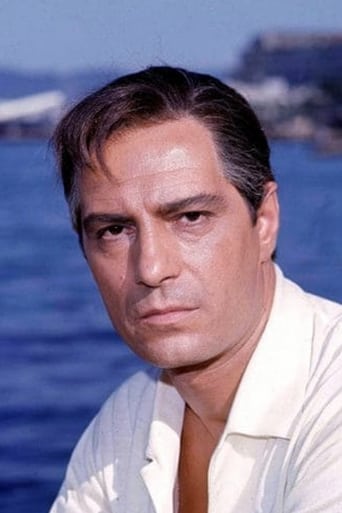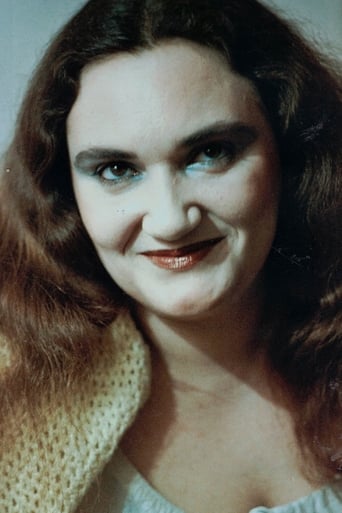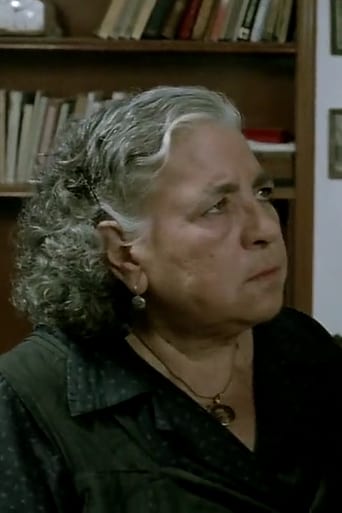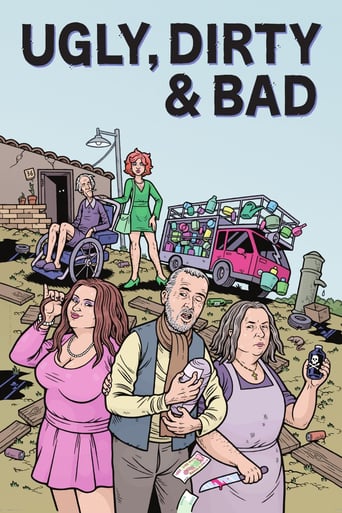
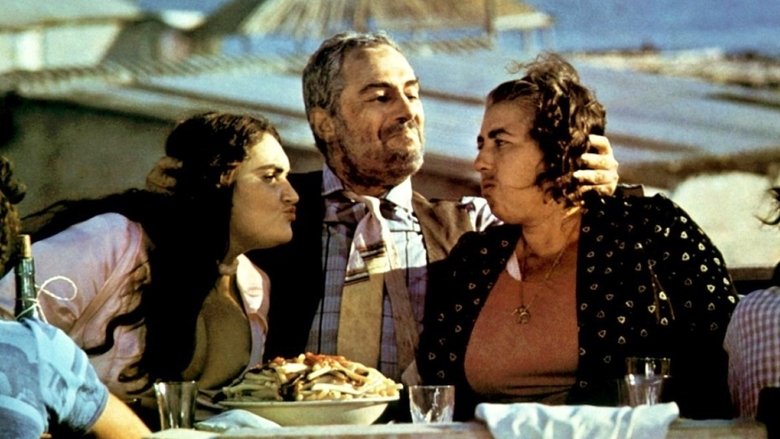
Ugly, Dirty and Bad (1976)
Giacinto lives with his wife, their ten children and various other family members in a shack on the hills of Rome. Some time ago he has lost his left eye while at work, and got a consistent sum of money from the insurance company, which he keeps hidden from the rest of the family. His whole life is now based on defending the money he sees as his own, while the rest of the family tries to kill him.
Watch Trailer
Cast


Reviews
Sadly Over-hyped
Good films always raise compelling questions, whether the format is fiction or documentary fact.
This is one of the few movies I've ever seen where the whole audience broke into spontaneous, loud applause a third of the way in.
While it is a pity that the story wasn't told with more visual finesse, this is trivial compared to our real-world problems. It takes a good movie to put that into perspective.
"Ugly, Dirty and Bad", the title alone gives you the perfect idea of what the film is about. And to those who expect the lyrical vision of Kurosawa's "Dodes'kaden", prepare yourself for a huge disappointment.So, on the surface, Ettore Scola's film is a realistic introspection into the life of Rome's inner-city, containing so many gut-wrenching and cringe-worthy moments that it feels like constantly reinventing the notion of horror. And in its core, it's such a disturbing experience that I don't think anyone could rationally review the film without getting rid of a gut-feeling oscillating between disgust and shock, and stuck like a booger on a finger.Maybe I should have used a positive idiom like 'fascination' considering the movie's undeniable comedic (and also comical) aspect, the problem is that the movie is obviously meant to shock: it opens with the sight of a dysfunctional family living in a cardboard shantytown, four generations sleeping and eating together. It's so crowded you can't really tell who is who and the very notion of intimacy becomes meaningless. Scola's vision of poverty is a masterpiece of iconoclasm as it deliberately challenges the whole Italian neo-realist heritage, since all the members of this family are indeed ugly, dirty and bad, making the most average schmuck look like Brad Pitt's clone.(And while in the best case, some members of this family are only concerned by one of these three repulsive traits, in the worst case, they're like Giacinto, the patriarch, played by a flamboyant Nino Manfredi. Giacinto lost an eye at an 'unfortunate' working accident that earned him 1 000 000 Lire of insurance, a treasure he jealously cherishes, rightfully believing that every one wants a share. On his own paranoid pedestal, Giacinto dominates his family like a condescending dictator.) "Ugly, Dirty and Bad" is a strange and unique movie nonetheless, when you watch it followed by Scola's interviews, you understand that it was intended to be a documentary first, until they chose to make a feature film. Still, the story's material is so simplistic that the documentary value is never lost during the first acts, while the score conveys the haunting melancholy hidden beneath the shouts and the cries. The movie evolves to a more dramatic level when Giacinto brings a whore, as if the house wasn't already full, and Iside, to name her, is so corpulent (the understatement of the year) that she would hardly go unnoticed. Yet, she inspired the others' antipathy less for her activities (which would have been hypocritical) than for the way she encourages Giacinto to spends his money. Otherwise, she provided enough distraction for some males to be accepted but after this last provocation, the family reaches a breaking point and starts plotting against Giacinto, elevating the film to a more Shakespearian level.Between the documentary and the tragicomedy, I wondered which of these aspects worked better, the one that throws you disturbing images to your faces with a 'no comment' silence, or the other that transcended the realism to a more theatrical level of absurdity. I guess if we took these two aspects separately, it's more difficult to enjoy the film. In a way, the authentic feel of the movie's inner ugliness allows us to understand the ugliness of the protagonists' actions. Let me develop this."Ugly, Dirty and Bad", the whole film works as an alibi to the title, an indirect way to point out that sometimes, even the most sacred institutions can be undermined by the poverty's condition. The film succeeds by not falling in the demagogic trap that would depict poor people as some sort of everyday good-hearted persons. It's dramatized to epic proportions, but the comedy is still the right tone, as it's the kind of stuff that would be too tragic if it wasn't so funny. In other words, it stinks so much that the film doesn't, see? I'm not rich enough to be arrogant and snob, which means 'bad' by rich standards, but I'm not poor either. As an ordinary person, I can only witness how dreadfully uneducated, poorest categories are, and how nasty and dangerous some become. If anything, "Ugly, Dirty and Bad" shows to what extremes poverty can lead, when the notion of possessing becomes such a luxury that some people would pay the biggest price to get the less valuable object, a bike, a good time with a girl, some money. The notion of possession is crucial to understand what drives these people's lives, why a girl brags about posing as a sexy model, why a man is a transvestite, why one steals etc. Each one takes a share of the European liberalism with what they can handle best, the film is also iconoclast as a powerful social commentary about the limits of the European dream.And Giacinto is the most powerful as the one who 'possesses' the most, and killing Giacinto was less a matter of honor than a way to prevent him from spending the money for the whore: 'not personal, strictly business'. Everything was for pure materialistic reasons, even the grandma is treated like a ticket for pension. And when the film takes a strange climax with Giacinto, victim of food poisoning, agonizing alone on the beach, until he makes himself a gastric lavage using his bike's pump, this incredibly disturbing scene demonstrates these people's ferocious' attachment to life, when dying means losing what you have. Giacinto basically couldn't afford to die.Ultimately, the only ones who're not concerned are the children, still not aware of how being rich looks to dream about it. Scola provides us some relieving moments to see the innocence and purity in these little kids' hearts before they would get perverted too ...as the film's last shot sadly suggests.
I just saw this movie, 25 years after it was filmed. Splendid. It's an Almodovar movie before Almodovar entered the field. The other commentaries said it all. I just want to point out the very last scene of the film.It's so poignant! that young girl we saw throughout the whole movie, as maybe the only innocent and pure creature among all these abominable characters, being the only one that took care of all the children in the slum, helping in the house chores, etc.Now she appears several months pregnant, doing the same things she always did, raising the first one in the morning, getting water for the family from a public faucet, and before getting to the faucet, she does a little ritualistic thing, she jumps over a low remnant of a wall and walks on its edge --dreaming of being a tightrope walker maybe?-- as the only pleasure she got as a child and even now, as a soon to be mother (because she's still a child).That ending shows us that there is no hope for some people in this world, generation after generation they where born to be condemned to live forever under those conditions. Magnificent film!
I saw parts of the movie when i was a child, today i had the pleasure of having a second chance to see it. I grabbed the opportunity... I'm a person o likes cinema in general, maybe more independent, but keeping the attention on the products of the enterprise... The film is a pungent, powerful blow to the modern society... When it premiered it was also in this condition... But nowadays the film balances between the tragic and the comic gender, with a sensitive eye... Very funny... Extremely dramatic... The ironic look, that scola gives to the foundings of European civilization, the ability to survive, how in extreme conditions (poverty, famine, lack of hygienic conditions) the humans have the capability of preserving values has purity, humor, fantasy And without being afraid in addressing the darkest side of man, the violent being, the amorality, putting aside the fear of shocking th audience Etore manages a brilliant timing in managing the drama and the comedy More would take place in this reflection but I don't want to risk sounding (even more ) pretentious . One of my favorite movies... Até já... ps: I apologize for the quality of my written English...
The great Nino Manfredi stars in this side-splitting and brutal black comedy about a bacteria-like family of degenerates occupying the slums on the outskirts of Rome. Manfredi is the misanthropic and miserly aging patriarch who has a secret hoard of money he guards zealously. He despises his wife and cretinous children who try to rob his stash and try to kill him by poisoning his maccaroni. You really won't believe this marvelous quintessence of gross until you see it with your own eyes. It is "commedia all'italiana" in full force.


